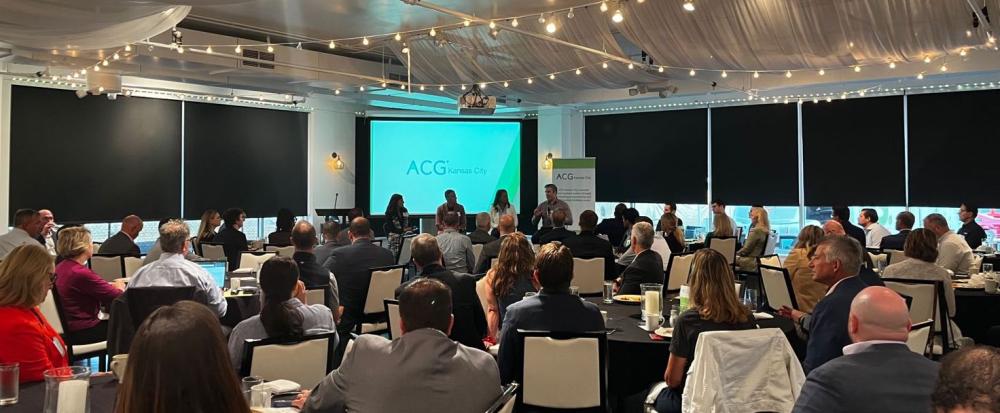

No doubt about it: Consumerism drives much of the U.S. economy and exerts a major influence on our culture.
And marketing is key to directing and responding to consumers’ brand awareness and preferences.
ACG explored the subject with a presentation called “Consumer Brands in the Age of the Consumer” at its monthly breakfast meeting June 9.
The event’s panel and moderator comprised:
- Thalia Cherry, founder and CEO of Cherry Co., a provider of sports-related apparel licensed from college and professional sports teams
- Keith Bradley, co-owner of Made in KC, a marketplace for locally made products
- Aaron Zack, CEO of Sunlighten, a provider of infrared saunas and accessories
- Allison Berey, CEO of corporate growth consultant M:Calibrate, moderated the discussion.
Berey opened the presentation with the questions: Why did you start your business? What motivated and inspired you? What expectation did you have for your business? How has it played out?
Cherry was a college athlete in multiple sports. She found few offerings for women around sports and fashion, “and I wanted something that united them.” She also saw that few women were involved in the business of combining sports and fashion. She founded her company in Kansas City in 2012.
Bradley started Made in KC in 2015 “to provide local Kansas City artists and makers a platform to reach customers in Overland Park,” according to the company’s website. He said at the event that he had wanted “to celebrate being local as a positive” and called Made in KC “an artist-driven” company.
He later opened stores at Village at Briarcliff in Kansas City North, Corinth Square in Prairie Village and the Crossroads in Kansas City. He also opened Made in KC Café locations in downtown Kansas City and on the Country Club Plaza.
He formed partnerships with HMK on the Plaza and at Hallmark in Crown Center. He opened the Made in KC Marketplace on the Plaza to showcase individual vendors in personally designed spaces. Made in KC now features work from more than 300 local artists, designers and makers at 18 Kansas City-area locations.
Zack was working at a corporate job in the pharmaceutical industry more than 20 years ago, always “trying to be innovative.” His brother-in-law was suffering from chronic fatigue, mercury poisoning and a spinal injury, according to the company’s website. He found relief through infrared light, recommended by his dentist.
This experience led him to start Sunlighten. Zack and his wife, Connie, joined the company.
Berey asked the panelists about “the role that marketing plays in your brain” and the strategic nature of marketing.
Bradley tried traditional marketing in newspapers, magazines and on the radio. But “social media presence is what works for us.” Customers told the company it “cannot say the word ‘local’ enough.”
Cherry said she has to segment her company’s marketing. “Our marketing probably has had the most return because we’re a woman-owned business,” she said.
Zack said businesses “can have the best message,” but if they don’t push product differentiation in their marketing, “it’s hard.” Product innovation also is key. Companies must have the best customer service and sales teams, but “marketing needs to be a true leader to bring everyone together.”
Strength and awareness of brands are also keys to marketing success, the panelists agreed. In the 1970s and 1980s, advertising delivered 500 to 1,500 brand impressions a day to consumers, Berey said. That has grown to between 8,000 and 10,000 brand impressions a day. Consumers are inundated with brand impressions.
Cherry responded with a sports analogy to emphasize the need to commit to your brand to reach your target markets.
“If you’re a track star, you never look left or right, because you’ll lose seconds,” she said. “Stay true to your brand and continue in that fashion.”

Register by January 14 to lock in the lowest rate and join 3,200+ dealmakers in Las Vegas on April 27-29, 2026.
